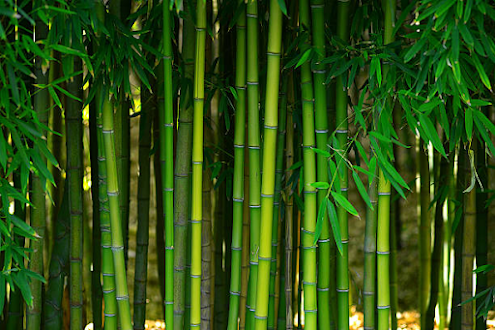1. Introduction to Bamboo:
Bamboo, often referred to as "Nature's Versatile Giant," is a fast-growing perennial grass that is celebrated for its multifaceted nature. It holds immense importance globally due to its diverse uses, ranging from construction material to culinary delight, and from environmental sustainability to cultural symbolism.
2. Rapid Growth and Sustainability:
One of bamboo's most remarkable qualities is its rapid growth. Some bamboo species can grow several feet in just a single day under optimal conditions. This makes bamboo an incredibly sustainable resource, promoting eco-friendliness and combating deforestation.
3. Eco-Friendly and Carbon Sequestration:
Bamboo plays a vital role in the environment by absorbing high levels of carbon dioxide and releasing a substantial amount of oxygen. Its extensive root systems aid in soil erosion control, making bamboo forests important for maintaining ecological balance.
4. Cultural and Historical Significance:
Bamboo holds immense cultural significance in various parts of the world. It's deeply rooted in the traditions and everyday lives of people, from Asia to the Americas and Africa. Its symbolism ranges from strength and flexibility to prosperity and resilience.
5. Versatility in Usage:
The versatility of bamboo is unparalleled. It's used for construction, furniture, paper, handicrafts, textiles, musical instruments, and even as a food source. It has found its way into modern sustainable architecture and is gaining traction as an eco-friendly alternative to conventional materials.
6. Environmental Benefits:
Bamboo is an ally in the fight against climate change. It grows abundantly without the need for pesticides or fertilizers, making it an environmentally friendly crop. Moreover, its regenerative nature and ability to restore degraded lands make it a valuable tool in conservation efforts.
7. Future Prospects and Sustainable Development:
The future of bamboo seems promising, especially in the context of sustainable development. It presents a viable solution for various global challenges, including poverty alleviation, climate change mitigation, and resource conservation.
8. Bamboo: The Green Gold:
Often referred to as "Green Gold," bamboo is an economic, ecological, and cultural treasure. Its potential to positively impact lives, foster sustainable development, and contribute to a greener planet makes it an invaluable natural resource.
Here's a comprehensive overview of the advantages provided by bamboo:
1. Sustainable Resource:
Bamboo is a highly sustainable resource due to its rapid growth. Some bamboo species can grow up to three feet in a day, making it an excellent renewable material for various applications.
2. Carbon Sequestration:
Bamboo plants sequester a significant amount of carbon dioxide, making them a powerful tool in combating climate change and reducing greenhouse gas emissions.
3. Soil Erosion Control:
The extensive root systems of bamboo help prevent soil erosion, stabilizing slopes and protecting against landslides in hilly and mountainous areas.
4. Biodiversity Conservation:
Bamboo forests provide habitats for various species, contributing to biodiversity conservation and supporting the balance of ecosystems.
5. Eco-Friendly Alternative:
Bamboo can substitute for traditional, less sustainable materials in construction, furniture, and packaging, offering an eco-friendly and renewable alternative.
6. Diverse Applications:
Bamboo has a wide range of applications, including construction, furniture, flooring, textiles, paper, musical instruments, culinary uses, handicrafts, and even as a biofuel.
8. Empowering Communities:
The bamboo industry supports local communities by creating job opportunities and providing a source of income, thus contributing to poverty alleviation and rural development.
9. Promoting Sustainable Development:
Bamboo promotes sustainable development by fostering environmentally responsible practices, offering livelihoods, and supporting socio-economic growth in various regions.
10. Cultural and Traditional Value:
Bamboo holds cultural and traditional significance in many societies worldwide, reflecting the heritage and customs associated with its use.
11. Architectural Innovation:
Architects and designers increasingly use bamboo in sustainable architecture, promoting innovative and green building practices.
12. Resource Efficiency:
Bamboo is resource-efficient, requiring minimal water, no fertilizers, and no pesticides to grow effectively.
13. Drought Resilience:
Certain bamboo species demonstrate resilience to drought, making them suitable for arid and semi-arid regions.
14. Educational and Research Value:
Bamboo serves as an educational tool and a subject of research, stimulating studies on sustainability, agroforestry, and environmental conservation.



Comments
Post a Comment